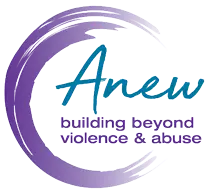Dancing for a cause: Anew fundraiser to get people moving in support of domestic violence victims
By Laura BruniDaily Southtown • Jun 07, 2023 at 5:33 am DJ Love will be spinning tunes Saturday in Homewood in an energetic event asking people to line dance, cardio drum and Jazzercise against domestic violence.A fundraiser for Anew, formerly known as South Suburban Family Shelter, the Dancing Away DomesticViolence event is scheduled from 3 […]
National Child Abuse Prevention Month: What you need to know? FOR IMMEDIATE RELEASE CONTACT: Kristine ScottPhone: (708) 794-2140 ext. 311Email: kris.s@anewdv.org National Child Abuse Prevention Month: What you need to know? Homewood, Illinois (April 13, 2022) April is National Child Abuse Prevention Month and Anew: Building Beyond Violence and Abuse recognizes the importance of families […]
Stability for Survivors: Freedom Through Financial Empowerment
10.19.22 by United Way of Metro Chicago You start working shifts as a cashier at the grocery store. After receiving your first pay, you check the joint bank account you share with your spouse. You’re shocked to see the balance is low. Your spouse tells you they’ve opened a new account and have transferred all […]
Column: South Suburban College provides domestic violence bystander intervention training for students and the public
By Francine Knowles Daily Southtown Oct 17, 2022 at 12:57 pm If domestic violence was happening in front of you, would you know how to respond? For many people, the answer is no. South Suburban College is addressing that issue by conducting live and virtual bystander intervention trainings as part of Domestic Violence Awareness Month activities. […]
Letter to the Editor FOR IMMEDIATE RELEASE Date: October 19th, 2022 Contact: Jennifer Gabrenya Executive DirectorAnew: Building Beyond Violence and Abuse jennifer.g@anewdv.org 708-794-2140 LETTER TO THE EDITORAs incidents of domestic violence continue to be ever present in our local media, we feel compelled to continue lifting up the realities of abuse and inform our communities that […]
SSFS continues services for those in domestic violence situations
By: Carole Sharwarko HF Chronicle March 25, 2020 Although Illinois has a “shelter in place” directive, South Suburban Family Shelter (SSFS) is still offering services to individuals and families who are in domestic violence situations. Kris Scott of SSFS said the bilingual 24-hour hotline is always open for those in crisis and in need of […]
Chamber of Commerce heads up 3-village holiday charity effort
By: Carole Sharwarko HF Chronicle November 16, 2019 The Homewood Area Chamber of Commerce (HACC), in cooperation with the villages of Homewood, Flossmoor and Glenwood, will conduct a charitable drive to support three local groups this holiday season. The Village of Homewood will collect items to support the South Suburban Family Shelter (SSFS), the Village of Flossmoor […]
